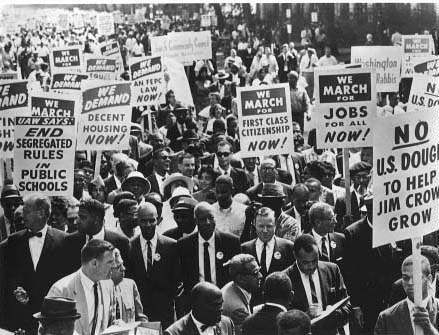The March on Washington.

The March on Washington
The March on Washington for Jobs and Freedom
The March on Washington was organised by groups of religious, labor and civil rights organisations and was initiated by AP Rudolph. Different organisers of the march had varying objectives. The NCAAP saw it as a means toi promote civil rights whilst other groups saw it as a means to promoting improved working conditions. The March took place on august 28th, 1963 and saw a crowd estimated to between 200,000 and 300,000 people march from the Washington Monument to the Lincoln Memorial. Once the march had reached the Lincoln Memorial they heard speeches from the leaders of the organising groups. The most famous of these speeches was Martin Luther King Jnr’s ‘I have a dream’ speech. There were also performances by musicians such as Bob Dylan, Joan Baez and Peter, Paul and Mary. The March on Washington received widespread media coverage and is widely acknoweldged as having a key role in ensuring that future civil rights legislation took place. Not everyone in the civil rights movement was supportive of the March though. Malcolm X, for example, said that it was ‘a picnic’ and criticised leaders for diluting the original purpose of the march by allowing whites and other organisations to be involved.
Source: Newsreel Footage of the March on Washington
Source: External link. The NPR website hosts a number of interviews with participants in the March on Washington, along with news reports about the March.
Links
Infoplease – article about the March on Washington.
Stanford – detailed account of the March on Washington.
Black Past – narrative account of the events.

